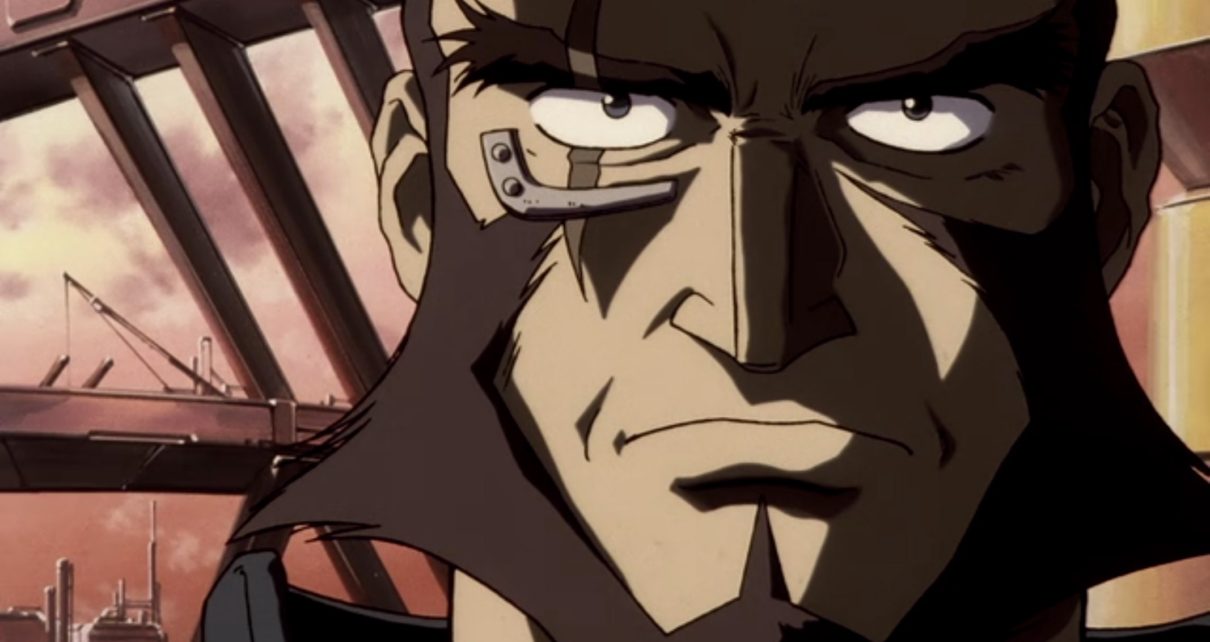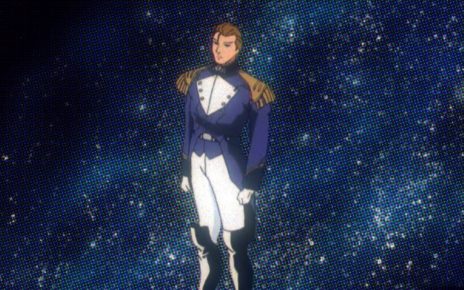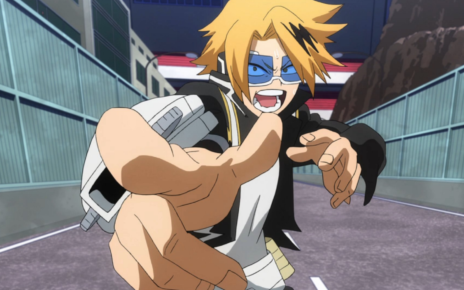Sessions 10,16,21: Ganymede Elegy, Black Dog Serenade, Boogie Woogie Feng Shui

For one month, The Dot and Line is publishing essays, interviews, and discussions about each episode of Cowboy Bebop, which turns 20 this April.
The key emotional turn in “Ganymede Elegy” comes in the middle of a chase scene with space jets. The Bebop’s original partners, Spike and Jet, nearly collide in mid-air while Spike is chasing down Jet’s ex-girlfriend Alisa and her boyfriend Rhint. There’s a bounty on Rhint’s head, and the only reason either of them are in the area to receive this information is because Jet lingered in town on Ganymede to pay a visit to Alisa years after she dumped him. It’s one of the many defining moments in Jet’s film noir–influenced central arc on Cowboy Bebop that proves he can’t grow beyond the person he was in his past. As the masterful fingerpicked guitar ballad by the Seatbelts, “Elm,” plays in the background, Jet tells Spike he should hang back, and let him take care of this particular bounty head: “When I was a cop, this was my beat,” he explains. “I’m the Black Dog, and when I bite, I don’t let go.”
This, of course, is some male ego–driven BS gone haywire in Jet’s head. It’s exactly the sort of line that Jet feeds himself to convince himself he’s doing the right or noble thing while failing to interrogate why he wants to do that thing. Over and over again Jet repeats this mistake, in sessions like “Ganymede Elegy” and the later, much darker episode “Black Dog Serenade,” both of which are so elegantly framed in the trappings of detective stories that it’s actually hard to spot just how messed up he is at first.
Jet’s character is arguably the most likable on the ship. He’s the crustiest, most experienced member of the bounty hunting team who sports a badass cybernetic arm and pilots a personal craft he calls the Hammerhead. He’s also a bonsai enthusiast with a soft spot for the ship’s corgi, Ein, and a big enough jazz obsession that he dreams about Charlie Parker and named his ship the Bebop. Jet is tough, but also sensitive and cultured. He is objectively cool the way your friend’s dad who DJs on weekends and knows more about hip hop than you do is objectively cool. But his cool comes with a laundry list of personality flaws and a self-entitlement that he has to surmount before he’ll ever find peace.
When we’re first introduced to Jet, he’s the muscular, older, wiser foil to Spike’s lankier, younger, brasher lead. Jet is the Bebop’s captain and cook and usually the guy pulling up bounty info, tinkering with their machinery, and keeping an eye on the funds they need to get by. He’s also got a high opinion of himself—as likely to brag about his own tech prowess to gangsters as he is to mouth off at Faye in sexist ways. Jet’s heart is never in the wrong place, ultimately, but his age and relative privilege compared to his fellow shipmates (as far as we know: he owns two spaceships; he doesn’t have a crime syndicate after him; he isn’t in mountains of insurmountable debt; he isn’t an orphaned child hacker savant) often blind him to his own shortcomings, at the expense of his emotional wellbeing, his personal health, and his relationships with his partners.
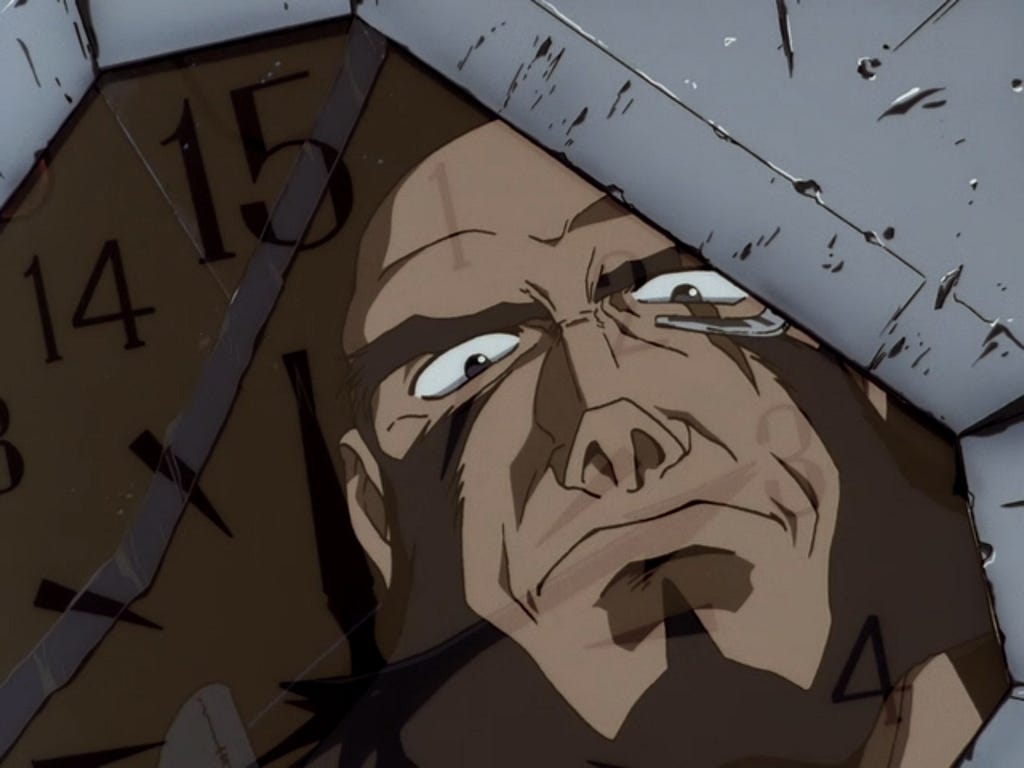
He can’t get over an ex who made her intentions clear
Take Alisa, for instance, the ex-girlfriend he can’t forget and drops in on after seven long years. Jet can hardly return to his home satellite of Ganymede—where he cut his teeth as a cop and first earned the “Black Dog” nom de guerre—without slipping into a silent, nostalgia-fueled reverie about the day Alisa walked out on him leaving nothing but a broken pocket watch and a letter with a single word written on it: “Farewell.” It’s a terrible way to break up with someone, but to hear Alisa tell it—again—a full seven years later when Jet suddenly re-enters her life, it’s obvious that he hardly gave her a choice. “That’s just how you were back then. You decided everything,” she tearfully explains, firing warning shots at him as he approaches her imposingly in order to secure the bounty on Rhint’s head. “In the end you were always right. When I was there with you, I never had to do anything for myself.”
Jet keeps walking toward her—the framing of the scene making his body fill up the screen while Alisa’s is diminished. Putting the gun down, she finishes: “All I had to do was to hang onto your arm like a child without a care in the world,” she says. “I wanted to live my own life, make my own decisions—even if they were terrible mistakes.”
Alisa left Jet because he was suffocating her with overprotectiveness and not allowing her to grow as a person. As a result, she moved on. Afterward, she found Rhint—a lowlife, maybe, but a guy who was willing to kill a mob boss for her, maybe even die for her, even if he is terrified of going to jail. In Jet, she had someone who, as she hints in her monologue, was obsessed with his job and his proud code of law and order and whose stubborn alpha act eroded her agency until she couldn’t even talk to him anymore.
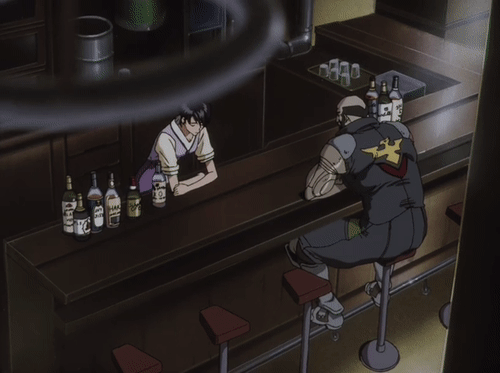
This gets teased a bit when they reconnect at the bar earlier in the episode. The editing in the conversation between Alisa and Jet, when they first talk, is abrupt, jumping back and forth between close-ups of the two of them—as if time itself was out of sync with Jet and Alisa’s respective recollections of the events of the past. That scene and the episode overall are also rife with images of time in motion: the melting ice cubes in Jet’s glass, the way the episode starts in the morning and ends with a stark orange sunset, the shots of Faye preparing to tan later followed by her fully tanned, the frames of a decorative drinking bird that dips its head like clockwork. Even one of the episode’s key soundtrack choices, “The Singing Sea,” features the lyric, “The world spins backwards every day,” as if Jet wished that were true.
“Time never stands still.” For Jet, that’s not satisfactory.
In the talk with Alisa, though, Jet doesn’t seem to notice any of these indicators that time has moved on, talking about how he had resolved years ago that if the clock stopped before Alisa returned to him, he would leave Ganymede for good. And of course, she never came back, nor does she regret it. “The way you talk about [the past], you seem to think that time really has stopped here,” Alisa tells Jet, not unkindly. “Time never stands still. I’ve got to go. Bye, Jet.” The relationship is dead. It is an elegy, after all.
For Jet, that’s not satisfactory. Earlier in the episode, the mere mention of Alisa’s name makes him verbally wince in such a subtle, heartbreaking way that it should have secured English voice actor Beau Billingslea some kind of award. And when he looked her up again, seven years later and broken pocket watch in hand, what was he looking for, exactly? Closure? An explanation? Rekindling the flame? Faye correctly points to Spike that the latter was a fool’s errand, and Spike—dealing with his own lady issues—all but rebukes her for it. Jet tells Alisa he “just wanted to know why,” but it’s hard to believe that after after the fact. Just look at his reaction to her explanation for leaving. Does it look like Jet really wanted to know?
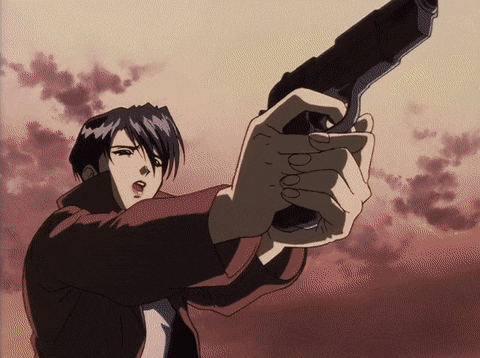
Jet’s face is filled with genuine surprise when Alisa lays into him with the stuff about his being overbearing, but then it shifts to grim resolve. Her explanation was probably the last thing he wanted to hear because, in the back of his mind, he knows exactly what pushed her away. When he came back, he was hoping for the outside chance that she was still single. He wanted their past to not mean anything. He wanted her back. He wanted her to save him, in his words, from “wandering around with a bunch of weirdos.” Even after that’s a no-go, Jet still can’t let her go. Having caught Rhint, he began lecturing at him to “take care of her,” as if he actually did believe the woman he smothered but claimed to love really was a child after all.
Frankly, none of this is a very good look for our baldheaded boy, and I’m not the first to point it out. Simon Abrams of The AV Club highlighted a number of these same issues in his review of the episode years ago. One relevant bit:
[Alisa’s final explanation to Jet is] a powerful rejection but one that’s totally mishandled thanks to the way that the cops still come to collect Rhint after Jet gives him his blessing to “protect Alisa.” The idea of passing the torch of being an over-protective manly man to Rhint goes against almost everything that Alisa just complained about. Jet has to be right, has to make the decisions.
Mishandled isn’t the word I’d use. Jet’s actions are definitely framed as positive ones, but they’re in line with a series often known to end dour episodes on lighthearted notes. (The playing card scene in “Ballad of Fallen Angels” is a good Spike analogue.) And Jet doesn’t grow much from the experience except to throw the broken watch into the river and wrap things up cordially with Alisa—that he mishandles the situation, in spite of a neat wrap-up, is sort of the point. In many ways, the central thesis of the show Cowboy Bebop is rooted in the inability of characters like Jet, Spike, Faye, and Ed to move on from their respective pasts. While Jet may end this session by finally snuffing out his old flame, the next one in his series arc shows just how problematic and dangerous being the Black Dog can be.
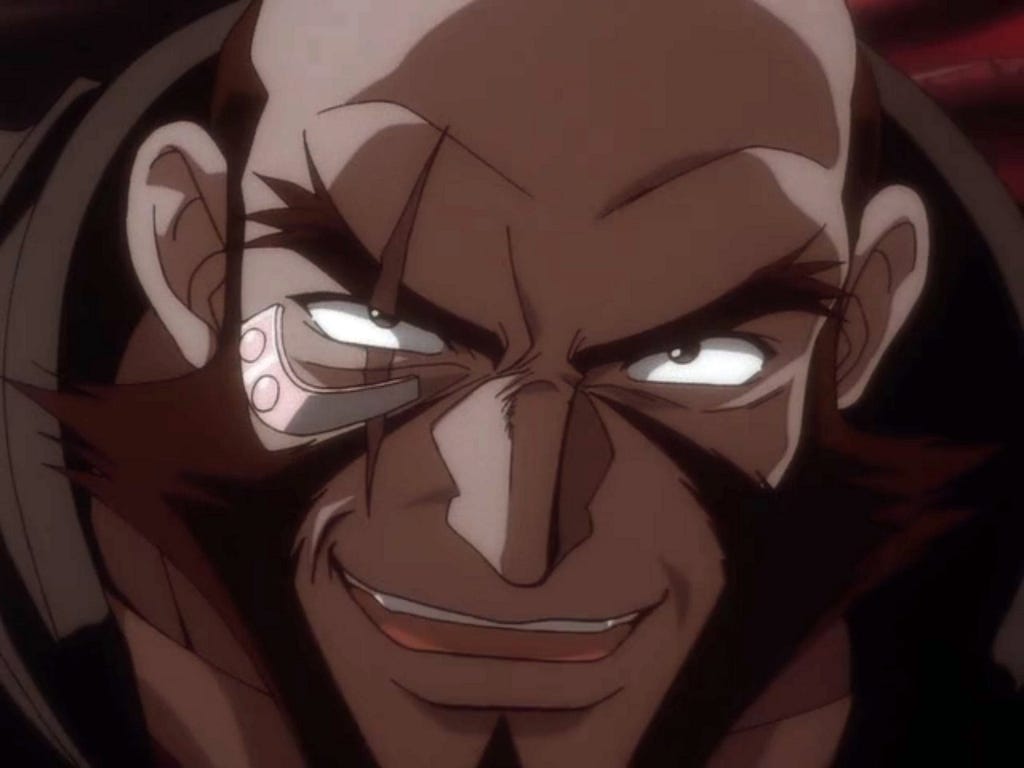
He’s trying to re-live his glory days with a shady partner
If “Ganymede Elegy” is Jet at his most lovelorn, “Black Dog Serenade” frames him at his most vindictive. The setup is classic noir: a group of bad guys, including an old nemesis, break out and hijack a prison ship, and Jet’s old investigative partner recruits him to help catch them. As it so happens, the guy they want to catch is the jerk responsible for shooting Jet’s arm off. There’s even a fun foreshadowing scene when Faye points out that the arm could be repaired inexpensively, and Jet reacts stubbornly, gripping his left arm and declaring, “This arm is my arm. I don’t need instructions.”
And in some ways, like Alisa and her watch, that arm is everything to Jet and his self image. The moody, darkly violent episode reveals that the person responsible for robbing Jet of that arm was Udai Taxim, a notable crime syndicate assassin. When Jet’s old partner, Fad, shows up and offers Jet a shot at vengeance, he can hardly pass it up. Over a saxophone version of that same tune, “The Singing Sea,” that we heard when Alisa was first mentioned in “Ganymede Elegy,” we get a sepia-toned flashback to the day Udai shot Jet’s arm off. In the present, this new opportunity is too good for the Black Dog. Ribbing his friend about their old-school choices in weaponry and quitting smoking just doesn’t cut it—he has to make good on this score.
On the Bebop, everyone seems to get that this is in some way a bad idea. Even Spike—the king of running off on ill-advised missions to take out enemies from his past—scratches his head at Jet putting Edward in charge of watering his bonsai collection (which results in a minor flood). For Faye, resident advocate for making Jet whole again, this becomes a hygiene problem; she can’t shower since he takes off before repairing the ship’s often-failing systems. And the episode makes clear, as if it weren’t already, that the team needs Jet to function as a unit. No bounties are caught in this episode. No money is made. They’re effectively adrift the entire time Jet’s off gallivanting with his old pal—who we learn isn’t an old pal at all.
That’s one of the tragedies behind “Black Dog Serenade” and the tragedy behind Jet’s obsession with his sepia-toned past: he remains willfully blind to both his present and what the realities of that past were like. “I didn’t want to come here, but something else insisted,” Jet snarls as he grapples with Udai. “The arm I lost because of you.”
Jet’s morals ultimately vindicate him, but he still ends up feeling pretty miserable.
It’s understandable that Jet would want revenge, but as Udai points out, he’s been looking at the wrong person for it the entire time. It was Fad. His partner! The later revelation isn’t a terribly shocking one, but let’s piece it all out here: 1. Jet’s psychologically fraught over this narcissistic and nostalgic notion of himself as some super-cop 2. which is reinforced by his manipulative ex-partner 3. who is actually the guy responsible for nearly killing him and de-arming him years ago 4. and now he’s been lured onto a ship full of escaped criminals, including that other guy he thought was his nemesis for years, 5. without any backup from Faye, Spike, or Ed.
And his own myopia, exacerbated by all these deep-seated issues inextricably tied to this macho self-image, created this situation. His obsession with settling scores, his inability to move past events that others in his circles have already forgotten, and his ignorance of the family that has slowly developed around him (which he, like Spike, is almost irresponsibly blind to and routinely undervalues) all contribute to a deeply sad existence and a mid-life crisis you wouldn’t wish on anybody.
“What a clueless chump you are,” Udai taunts. “You never figured it out in all this time.” He’s talking about Fad, and how Fad betrayed Jet, but he might as well be talking about all the ways Jet’s ego has brought him to this point.
The end of “Black Dog Serenade” is fittingly grim. Like the best old-school pulp detective stories, Jet’s morals ultimately vindicate him, but he still ends up feeling pretty miserable. This one doesn’t end with any goofy scene on the Bebop or offer levity. Instead, the hero watches his friend bleed out thanks to actions he himself took trying to vindicate his own “Black Dog” self image. There’s one moment where his arm saves him from one of Udai’s bullets, shot from point blank, but we shouldn’t confused that with Jet’s soul being redeemed thanks to taking out the actual man who took his arm. The upshot of this is that because it’s so grim, Jet seems to take it as some kind of lesson this time, as we see in his next big solo episode.

There may be redemption in his future
If Bebop is a show about a group of people who either can’t change because they’re so stuck in their preconceived notions about themselves or their pasts, Jet’s arc—and it is a clear, mostly successful arc—seems to offer some small modicum of a counterargument in the episode “Boogie Woogie Feng Shui.” It doesn’t force Jet into any sort of 180-degree shift, but it’s still a detective story (this time with pitch-perfect voiceover narration). And it’s still a headlong dive into his past, too, but it forces Jet to confront that past on a case that is not his own in a setting well outside his expertise. The mystery: find out how a dead feng shui master, Pao, could send a message to Jet from beyond the grave, and figure out how Pao’s daughter Meifa factors into it.
The episode thrusts Jet out of his natural investigative or technological comfort zones and into the supernatural, partners him with a young woman who’s explicitly not a love interest, and forces him to humble himself dramatically in front of her. It’s not as obviously artistic as the poetically wistful “Ganymede Elegy” or the noir-drenched “Black Dog Serenade,” but it offers a great contrast to the other two. It puts Jet through his paces in other ways, pulling him through a case while Meifa does most of the work, rather than watching him solve it, and explicitly framing its focus on her, because he’s focused on helping her. It’s such a different set of circumstances for him that it puts him on edge. There’s even a scene where Jet has to scarf down an ice cream cone to stop it from melting in front of Meifa.
“Perhaps I gave myself too much credit.” — Pao
Its climax squares Jet up against Pao, a father who worked for criminals for years, all the while trying to insulate his daughter from his life of crime. In the end, his neglect only succeeded in hurting their relationship. While near death after being trapped in a cosmic anomaly, he contracted Jet for his sleuthing skills in order to bring Meifa to the anomaly. Pao finally gets that face time with his daughter, but it’s largely due to her feng shui mastery, not Jet’s sleuthing or expertise. But when talking to Jet and his daughter Meifa for the first time in ages, Pao says it was his machinations that led them on a wild goose chase searching for a man presumed dead. Jet actually contradicts him, lecturing him a little, while also throwing the credit to Meifa, whose work propelled the narrative forward the whole episode:
“It’s not right,” Jet says. “You weren’t in control of this operation. Meifa is here now because—because she wanted to find you.”
“You may be right,” Pao agrees. “Perhaps I gave myself too much credit.”
It’s a simple, short exchange, as is the ensuing family reunion talk between Pao and Meifa, but it’s a moment of heartfelt generosity from Jet, aimed at a young woman he has no romantic interest in and who spent a whole episode doing nothing but proving her mettle in front of him. Certainly it’s a far cry from what he might have said in any lectures to Alisa on how to live her life or some of the sexist remarks and generalizations about women that he would toss around when Faye first joined the Bebop. That feels like progress.

Thanks for reading The Dot and Line, where we talk about animation of all kinds. Don’t forget to for this article and follow us on Twitter and Facebook.


